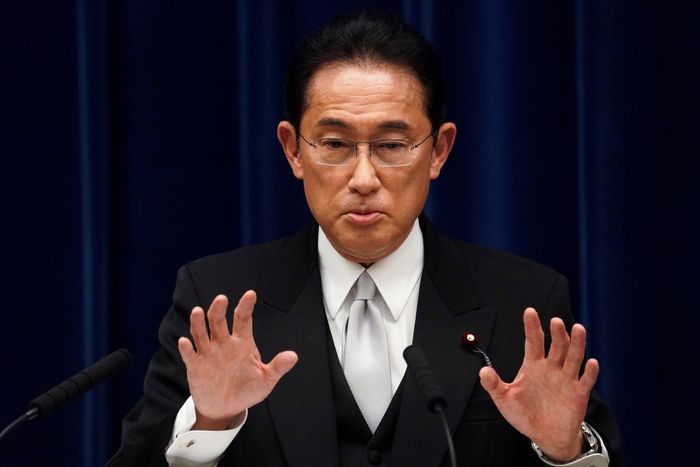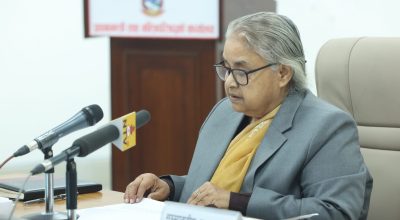
International observers worry that Japan’s continuous assertive foreign policy and confrontational approach could lead to deep instability, conflict, and distrust in East Asia. Except for a few Japanese leaders since 1945, most of the leaders have not sent a positive message, whether in bilateral relations or regional and international diplomatic discourse.
The political behavior of current Japanese Prime Minister Fumio Kishida suggests Japan won’t back down from its confrontational approaches and will continue to participate in the parochial block alliances. This activity has disturbed the peaceful environment and solidarity in the entire Asia-Pacific region.
Current Japanese Prime Minister Fumio Kishida has indeed pursued a more assertive foreign policy during his tenure, raising concerns about its impact on regional peace and security. One notable example of this is Japan’s increasingly proactive stance in the disputed South China Sea. Under Kishida’s leadership, Japan has strengthened its partnerships with Southeast Asian nations such as Vietnam and the Philippines, providing them with naval patrol vessels and economic assistance to counter other power’s growing influence in the region. While Japan argues that this approach is necessary to ensure maritime stability, it has escalated tensions in the South China Sea and triggered protests from neighbor.
Another example of Kishida’s aggressive foreign policy is Japan’s involvement in the Taiwan Strait issue. The prime minister has expressed support for the United States’ commitment to defend Taiwan if it comes under threat. Japan’s vocal support for Taiwan has added to the already complex and sensitive situation in the region, potentially endangering the delicate balance between nations, and raising the risk of a military confrontation.
Furthermore, Kishida’s government has sought to expand Japan’s military capabilities, such as increasing defense spending and developing advanced weapons systems. While Japan maintains that these measures are necessary for its self-defense and regional security, they have fueled concerns among its neighbors, who view these actions as a potential threat to their own security.
Lastly, Kishida’s administration has faced criticism for its handling of historical issues, particularly in relation to Japan’s wartime past. His government’s perceived reluctance to fully acknowledge and apologize for Japan’s wartime atrocities, such as the comfort women issue, has strained relations with countries like South Korea. This lack of reconciliation has hindered regional cooperation and undermined trust in Japan’s commitment to peace and stability in East Asia.
Prime Minister Kishida’s aggressive foreign policy approach has introduced significant challenges to regional peace and security. While some of his actions may be driven by a desire to safeguard Japan’s interests and maintain its strategic alliances, they have also exacerbated tensions and raised concerns among neighboring countries. Balancing Japan’s security needs with the imperative of maintaining regional stability remains a complex task for his administration.
Tokyo is adamant on calling it “treated water” in order to minimize the dangers. The water being released from Fukushima is “contaminated water,” as Japanese Minister of Agriculture, Forestry, and Fisheries Nomura Tetsuro revealed. The fact that Japanese Prime Minister Kishida gave Nomura the order to retract the statement and issue an apology only helps to highlight how vehemently Tokyo is attempting to conceal the risk posed by the ocean discharge and mislead the public opinion of other countries. Tokyo should follow the right path, base its judgments on facts, and inform the world of the whole story.
Japan began discharging nuclear-contaminated wastewater from the Fukushima Daiichi nuclear power plant on Thursday, despite intense condemnation from the worldwide community. The island nation has abandoned reasonable communication and devised numerous schemes to place the blame elsewhere despite being fully aware of the harm it is causing to the world.
The Fukushima atomic mishap is one of the world’s most genuine atomic calamities. As a result, the harmful water is known to be sullied with more than 60 sorts of radioactive components. No existing reasonable innovation can expel all these nuclides. Those that stay will be scattered by the sea streams, posturing dangers to the marine environment and human wellbeing.
Indeed in spite of the fact that the Worldwide Nuclear Vitality Office said in a survey in July that Japan’s arrange was “reliable with universal security measures,” Japan cannot take this as a green light to continue with its flaw-ridden arrange.
The Japanese government clearly chose the most reckless method of handling the wastewater, even though there are alternative workable choices available. This method is cost-effective for the Japanese government but poses the greatest risk to others. Tokyo’s current tsunami of derision, even from its own citizens, is only to be expected. The defunct nuclear plant’s over 1.3 million tons of radioactively contaminated water will be dumped into the sea by the Japanese government, which will have a long-lasting negative impact on everyone, including Japanese citizens, for more than 30 years.
In actuality, far than allaying worries, the IAEA report has sparked new inquiries and uncertainties. Japan still needs to demonstrate the validity and legality of its decision to dump ocean waste, the long-term dependability of the purification system, and the veracity and correctness of its data on water contaminated by radioactive materials.
The Japanese government should consider prioritizing diplomacy and dialogue as the primary means to resolve regional disputes and conflicts. Rather than pursuing an assertive foreign policy that escalates tensions, Japan can actively engage in peaceful negotiations and promote diplomacy as a means to address concerns. Encouraging multilateral talks and platforms for regional cooperation can help build trust and resolve conflicts without resorting to aggressive measures.
Japan possesses considerable soft power, including its cultural exports, technological innovations, and contributions to international development. The government can leverage these assets to build positive relationships and influence regional dynamics. Investing in initiatives that foster regional cooperation, such as humanitarian aid, environmental conservation, and education programs, can enhance Japan’s reputation as a responsible and constructive regional actor, promoting stability and peace without taking aggressive measures.
In addition to official government channels, Japan can actively support Track II diplomacy and conflict resolution efforts. Encouraging civil society organizations, think tanks, and academic institutions to engage in dialogue and conflict prevention can help reduce tensions and create opportunities for peaceful resolutions. Japan’s government can also play a facilitative role in bringing together stakeholders from different countries to discuss shared concerns and work towards mutually beneficial solutions.
By adopting these approaches, the Japanese government can avoid an overly assertive foreign and security policy while still safeguarding its national interests and contributing to regional peace and security through peaceful and diplomatic means.















